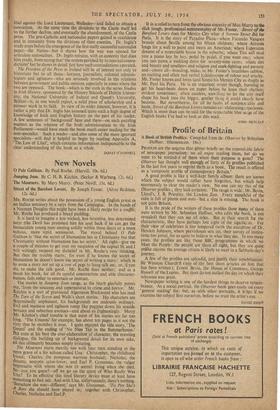Profile of Brithin
A Book of British Profiles. Complcd from the Observer by Sebastian Haffner. (Heinemann. 16s.) PROFILES are the sequins that glitter briefly on the expendable fabric of newspaper journalism: we all enjoy reading them, but do we want to be reminded of them when their purpose is gone? The Observer has thought well enough of forty of its profiles published in the last five years to reprint them as a book. The result is offered as a 'composite profile of contemporary Britain.'
A good profile is like a well-kept family album: there are scenes which the subject would rather have forgotten, but which help enormously to clear the reader's view. No one can say this of the Observer profiles ; they lack certainty. The range is wide: Mr. Bevin, Lloyd's, J. B. Priestley, the London Zoo. Every mouthful of the cake is full of plums and nuts--but a slice is missing. The book is not quite Britain.
It is the pride of the writers of these profiles (how many of them were written by Mr. Sebastian Haffner, who edits the book, is not revealed) that they can sec all sides. But in their search for the characteristic, they have perhaps lost sight of the significc.nt. For their view of celebrities is too tempered (with the exception of Dr. Hewlett Johnson, where peevishness sets in), their survey of institu- tions too jovial, for us quite to believe in what they see. In too many cases, the profiles are like those BBC programmes in which we Meet the People: the people are there all right, but they are quite unlike anyone the average citizen is likely to meet in a Sabbath-day's journey.
A few of the profiles are splendid, and justify, their republication: Sir Winston Churchll (one of the best short articles on him that has been written ), Ernest Bevin, the House of Commons, George Russell of the Lupins. But most do not outlast the day on which their relevance was great.
Newspaper writing is one of the hardest things to deserve remem- brance. As a social portrait, the Observer book goes easily on every `general reading' list: but, as with other portraits, it h^lp3 if we examine the subject first ourselves, before we trust the artist's eye.


































 Previous page
Previous page